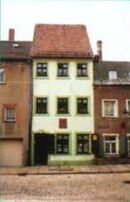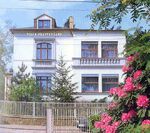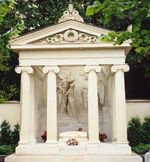Language: • Indonesia • English
|
AUTHOR PROFILE
| |
|
Name
|
Karl May
|
|
Born
|
25 February 1842
|
|
Hohenstein-Ernstthal
Saxony, Germany | |
|
Death
|
30 March 1912
|
|
Radebeul, Germany
| |
|
Wife(s)
|
Emma Polmer (divorced)
Klara Plöhn |
|
Note(s)
|
His works numbered more than 80 titles, and have been translated into more than 30 languages.
|
Karl Friedrich May (1842-1912) is one of the most famous German fiction authors. His works numbered more than 80 titles, and have been translated into more than 30 languages.
Brief biography[]
Childhood[]
- Main Article: Karl May's Childhood.

The house which Karl May was born.
Karl May was born on February 25, 1842 in Hohenstein-Ernstthal, Saxony, Germany, in a poor weaver family of Heinrich August May and Christiane Wilhemine Weise. He was the only son of fourteen children of Christiane. From the fourteen, only five survived. Not long after he was born, Karl May suffered blindness because of malnutrition.
During this time, his grandmother often told him stories of Arabian Nights. According to Karl May, his grandmother known these stories by heart and he did not need to go to the library to find this "ancient book". Later, these stories would influnce his career as an author.
When Karl May was four years old, his family's economic condition became a little better after his mother was accepted into a course to become a midwife and passed with good result. Because of his mother's connection with two doctors, Professor Grenzer and Professor Haase, Karl May could be operated and could see again.
Seminary[]
After finishing elementary school in 1856, Karl May could not continue his study due to the poor condition of his family. Therefore he went to a school for training teachers (seminary). And this was able to happen because of the support of one nobleman.
At his third year, this 'incident' happened. Karl May's classmate reported him stealing candles. Karl May defended himself by saying that when on duty to change the school's used candles, he only collected used candles and would like to take them home on Christmas holiday, as a gift to his poor family. Later, it was revealed from his school's report book that new candles was found in his locker.
Becoming a teacher[]
After graduating from seminary, Karl May was accepted to teach at a school for children of poor families. He quitted after two weeks because he could not comply to the very strict school regulation. However, there were rumours that he quitted because he had problems with the wife of the family he lived with.
After being unemployed for sometime, he was accepted to teach in a school for children of factory workers at Atlchemenitz on November 1861. He lived in a boarding house provided by the school. The room is for two, and there was already other person living there. There was also incident happening in this place because of a wristwatch.
At the time, it was considered improper for a teacher not to have a wristwatch. Therefore, his roommate offered him his old wristwatch. Karl May declined this offer on reason that he still had no savings, and had planned to buy a new one someday, but his roommate still offered to lend him his wristwatch anyhow, which must be returned every time he went home from teaching by hanging it on the wall.
Prison time and suffering DID[]
After a few days, Karl May did not hang the wristwatch on the wall but kept it. He took the wristwatch home with him for that Christmas holiday. When he was enjoying the holiday in his hometown, a policeman came and took him into custody for the charge of stealing the wristwatch. He was sentenced to six weeks in prison, from 8 September until 20 October 1862. Karl May had only been teaching in the school for two months.
Karl May became very disapointed when he remembered his family, especially his father who had a big hope of him being a teacher, to improve his family's economic condition. This event really shook him, because as an ex-prison inmate, he could no longer teach.
This mental disturbance, and also because of unemployment, even though he still had the opportunity to become private teacher and choir leader, lead him to suffer mental illness called Dissociative Identity Disorder (DID), which makes the sufferer have a split personality. He often disguised himself as another person, such as an eye doctor who made prescription in Latin, a seminary teacher who bought fur coat without paying, and other petty crimes. Following these crimes, he was sentenced to four years in Zwickau prison, but only served for three years and four months (June 1865-November 1868), and released early for good conduct.
Developing interest in writing[]
When in prison, he obtained a special right to borrow manuscripts and books from the prison library. His interest in writing began to grow. In this prison, he developed many ideas which would be further developed into his many famous stories. These ideas would be known as Repertorium C. May.
Hiding in a cave, and return to prison[]

The cave that is said to be Karl May's hiding place.
After he was released from prison, his mental illness was not yet cured. Again, he disguised himself as a policeman who arrested people on charge of circulating counterfeit money, or becoming a secret agent, and an employee of a law firm. He also committed various crimes, such as stealing a billiard ball, horse, even carrying loot in a baby carriage. When he was about to be arrested, he escaped to Bohemia, which at the time was a part of Austrian Empire (now it is a part of Czech Republic). It was said that he hid in an ex-mining cave. This cave is now a tourist site, which is known Karl May's Cave. On July 1869, he was re-arrested and put in Waldheim prison for four years.
When he was in this prison, Karl began to make connection with Münchmeyer Publisher, with the help of his father. [Heinrich Gotthold Münchmeyer]] was interested in his ideas when he was in Zwickau prison.
Recovery[]
During his time in Waldhiem prison, Karl May received a more effective therapy for his mental illness. By a Catholic monk named Johannes Kochta which was on duty in the prison, Karl May was given books which made him realise his illness. He was also given consultations and musical therapy which finally recovered him of his illness.
On 2 May 1874, he was released from prison. In total, Karl May spent time in prison for seven years and four months.
Becoming an editor[]
In 1875, right after he was released from prison, Karl May became junior editor Münchmeyer publisher. At this time, he wrote stories in the form of kolportage roman (petty romance novel), which was published periodically in the form of booklets, and sold from house to house at a low price. Not until four years later, his works were published in the form of book, and it was published together with another author's work, the author being named Fr. C,v, Wickede. This first book is titled Im Fernen Westen (At the Far West).
He began to further developed his ideas in prison, which he combined with the fact that 'rebelion' of Native American tribes, which at the time, was hot news. He began to write stories in a genre which was at the time still a new wave in literature world, that is reiseerzählungen (adventure stories).
Also at this time, he created a Native American character named Inn-nu-woh (1875), which would be developed later into a Native American character from Apache Mescalero tribe named Winnetou, which became very popular.
Karl May the author[]
As an author, Karl May was very productive. He had written more than 80 titles. Almost all his work is written in the form of series, which was published in several magazines. Not until 1890, seven of his works of Stories for Young People was published in the form of book by Union Deutsche Verlagsantalt. Those seven stories were: Der Sohn des Bärenjägers (Son of the Bear Hunter) which was published along with Der Geist des Llano estakado (The Ghost of Llano Estacado) in the same book, Der Ölprinz (The Oil Prince), Der Schwarze Mustang (The Black Mustang), Der Schatz im Silbersee (The Treasure of Silver Lake), Das Vermächtnis des Inka (The Testament of The Inca), Kong Kheu, das Ehrenwort (Kong Kheou, The Oath), and Die Sklavenkarawane (The Slave Caravan).
His biggest achievemnet is when Friedrich Ernst Fehsenfeld publisher from Freiburg published his series titled Orient Zyklus (The Oriental Cycle, 1892), in the form of hardcover book, which is more popular by the title Kara Ben Nemsi Series, a series of six books. In the following year, his masterpiece titled Winnetou trilogy was published (1893). The total of his works in the genre of 'Adventure Stories' consists of 33 books, which was published until 1910. The sum was still added one more book published in 1910, titled Mein Leben und Streben (My Life and Effort), an autobiography.
Became rich and getting married[]

Villa Shatterhand, Karl May's house in Radebeul.
Because of his books, he became rich. He bought a luxurious house outside Dresden, Radebeul, which was named Vila Shatterhand, and he lived there until his death. He married Emma Polmer on 17 August 1880, a woman 15 years younger than him. This marriage did not last long because they were not compatible to each other, and soon divorced. A year later, he married a widow named Klara Plöhn, a widow of his friend, Richard Plöhn. Although he was married twice, he did not have any children.
In his house, he owned a fairly complete private library. In this library, he owned various reference, dictionaries, guide books, and also maps which he used to do research for his stories.
In old days[]

Karl May's grave in Radebeul.
Although he was already in old age, Karl May was still productive. One of his books, Ardistan und Dschinnistan I-II (1907-09), which was considered his best work, was written at the age of 65 to 67 years old.
On 22 March 1912, he was invited to speak in Vienna, Austria, to defend his thesis titled Empor Ins Reich Der Edelmenschen (Upwards to the empire of Noble Humanity) in front of a literature society, and was attended by two thousand people. The event was held by Vienna Academy of Literature and Music. Among the the audience was Bertha von Suttner, Nobel Prize winner for Peace of 1905. Karl May felt very honoured because of von Suttner's attendance. It was said that this event was also attended by a failed artist named Adolf Hitler, which would become a dictator and the leader of NAZI, and one of the starters of World War II.
Karl May was very fond of smoking, and in his old days, he suffered from respiratory and heart problems. Because of this, his doctor forbade him to go to Vienna, but he still went there anyhow. Eight days later, on 30 March 1912, at 10pm, Karl May passed away. It was said that his last words were: "Victory! great Victory! I see red roses (red color)!". He was buried in Radebeul cemetery with a tomb in Greek architectural style which resembled Apollo's Temple.
After he died, his house where he was born in Hohenstein-Ernstthal was converted into a museum which exhibits his childhood life. Villa Shatterhand also became a museum which exhibits his achievements in life.
Works[]
- Main Article: Karl May's Works.
Orient Zyklus (Oriental Cycle)
- Durch die Wüste (Through the Desert)
- Durchs wilde Kurdistan (Through Wild Kurdistan)
- Von Bagdad nach Stambul (From Baghdad to Stambul)
- In den Schluchten des Balkan (In the Gorges of Balkan)
- Durch das Land der Skipetaren (Through the Land of Albany)
- Der Schut (The Schut)
Winnetou series[]
- Winnetou Trilogy
- Winnetou I (Winnetou The Apache Chief)
- Winnetou II (Winnetou II: The Scout)
- Winnetou III (Winnetou III: Death of Winnetou)
- Winnetou IV (Winnetou IV: Winnetou's Testament)
Stories for Young People[]
- Der Sohn des Bärenjägers (The Son of the Bear Hunter) dan Der Geist des Llano estakado (The Ghost of Llano estacado)
- Der Ölprinz (The Oil Prince)
- Der Schwarze Mustang (The Black Mustang)
- Der Schatz im Silbersee (The Treasures of The Silver Lake)
- Das Vermächtnis des Inka (The Testament of The Incas)
- Kong Kheu, das Ehrenwort (Kong Kheou, The Vow)
- Die Sklavenkarawane (The Slave Caravan)
Miscellaneous[]
- Und Friede auf Erden! (And Peace on Earth!)
![]() This Karl May Indonesia article is a stub. You can help by expanding it.
This Karl May Indonesia article is a stub. You can help by expanding it.
